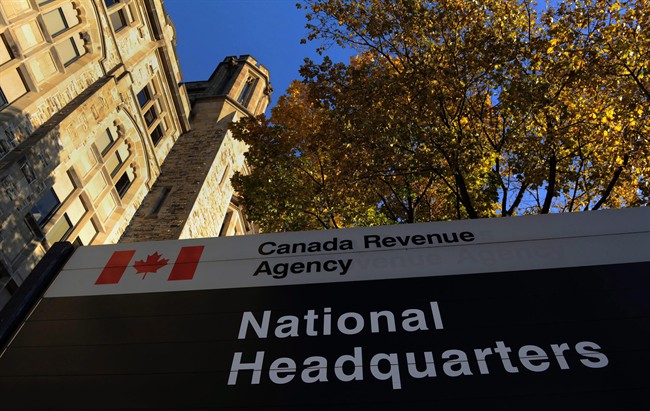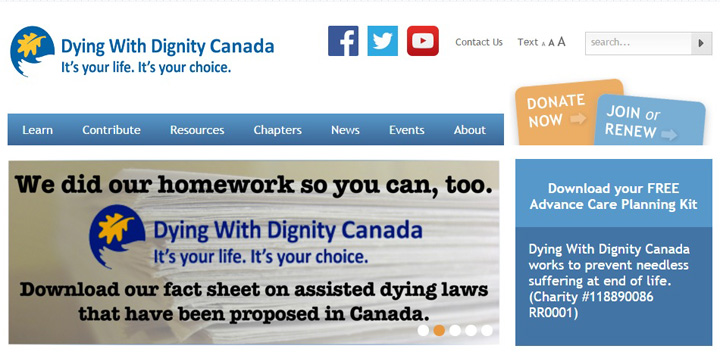TORONTO – A self-described “health and educational” charity aiming to promote discussion around doctor-assisted dying will lose its registered charity status in February because the Canada Revenue Agency (CRA) has decided to annul the group. Its reasoning? Dying with Dignity Canada was registered in error in 1982–and then again when it was re-registered in 2011.

The annulment is the result of a newly formed CRA political-audit group that launched in 2012-2013, which has already been accused of unfairly targeting charities who oppose the Conservative government’s policies.
READ MORE: CRA’s auditing of charities under scrutiny
But non-profit and charity lawyer Mark Blumberg, who represents DWD Canada, said while it’s uncommon–such an “error” isn’t unheard of.
“Right now–the last two years with the Harper government’s increased expenditures given to CRA to review the issue of political activities by charities–there’s no question that there’s greater scrutiny on Canadian charities and political activities. But Canadian charities have always had these rules that need to be complied with, and fundamentally the rules actually haven’t changed.”
READ MORE: Most Canadians support doctor-assisted suicide, but specifics reveal divisions
This increased scrutiny comes with a federal government that “doesn’t like to hear a lot of dissenting voices,” according to David Duff, professor of law at the University of British Columbia and director of the school’s graduate program in tax.
“There’s a legal base for it, they’re not making this up but…the current attitude in the CRA is that anything where there’s a challenge to an existing law, or questioning an existing law is political,” said Duff. “Therefore if this organization wants to change the law around assisted suicide, then that’s–in their view–inherently political.”
Duff said the message sent by the government seems to have been to “silence” those with opposing views and not support such organizations through any kind of tax assistance; he cited environmental groups as another example.
WATCH: Is the Harper government targeting environmental groups?
The DWD board has decided not to fight the annulment; Morris cited costly legal expenses and a low chance of success as reasons. Blumberg said the CRA has been in the Federal Court of Appeal in charity de-registration cases more than 60 times–and won every single case. The CRA said since April 1, 2010, there have been six Federal Court of Appeal decisions on charities challenging annulments or revocations of their charity status.
“In each case, the Court ruled in favour of the CRA,” said the CRA statement. Four cases are currently waiting to be heard; one has filed an application for leave to appeal with the Supreme Court of Canada.
But instead of fighting, DWD Canada is trying to focus on the silver lining: The CRA chose annulment for DWD, which means it gets to keep all of its accumulated assets. It also will be able to continue giving tax receipts for donations for the next month or so. Had DWD’s charity status been revoked, a tax would’ve been imposed that would essentially take away all assets, destroying the organization.
“The negative impact is that in approximately a month’s time, we’ll no longer be able to issue tax receipts,” said Morris. “So for individuals–major donors–that may affect the amount that they’re able to donate. Of course, that’s offset by the fact that we will be able to do unfettered political advocacy.”
Registered charities are restricted to “incidental” political advocacy, which is defined as 10 per cent of a charity’s budget, said Morris. It also means DWD couldn’t talk about individual politicians, officials or parties.
“Once we are no longer charitable, we won’t be able to give tax receipts, but we will be able to make the public aware of the various political platforms and who’s supporting physician-assisted dying.”
READ MORE: How doctor-assisted dying works in Oregon
DWD advocates for the legalization of physician-assisted dying, and suggested its workshops and presentations, newsletter, website and advance care planning resource kits as falling under “advancing education.” The CRA audit disagreed, saying DWD doesn’t conduct “any activities advancing education in the charitable sense.”
“The accumulation or dissemination of information that is selective, or unreasonably biased, or promotes a predetermined point of view does not qualify as advancing education in the charitable sense,” reads the CRA letter of annulment, provided to Global News by Morris. The letter said after reviewing DWD’s materials, the group’s focus is on promoting its view on “medically-assisted suicide.”
“The organization substantially focused on disseminating information promoting expanding choice in dying, including by securing the right to die, and by opposing the provisions of the Criminal Code prohibiting physician-assisted suicide,” said the letter.
Morris and Blumberg declined to comment on whether they believed the annulment was politically motivated.
READ MORE: Questions raised about bias in Canada Revenue Agency tax audits
When reached by telephone Tuesday morning, CRA auditor Julianne Myska (whose name appears on the letter to DWD Canada) declined to speak with Global News.
Ontario’s regional issues manager for the CRA, Neil Shalapata, referred Global News to a written statement from Public Affairs spokesperson Jennifer McCabe.
“The confidentiality provisions of the Income Tax Act prevent the Canada Revenue Agency (CRA) from commenting on the details of a specific organization without that organization’s consent,” said the statement, in response to questions about how a charity could exist for 30 years in error, particularly when it was deemed to have been registered in error twice.
The CRA said the term charitable isn’t defined in the Income Tax Act, so the CRA uses “common law (court decisions) to determine what is charitable.”
“There is an interpretive nature to the registration process in considering common law, and to what degree of accuracy and completeness the charity has represented itself. In rare circumstances, the CRA’s Charities Directorate has identified certain organizations that were indeed registered in error.”
From April 1, 2012 to March 31, 2013, there were nine annulments due to registration error; from April 1, 2013 to March 31, 2014 there were six, according to the CRA. You can read the CRA’s Charities Listings page to see a list of the thousands of revocations and annulments dating back to 1967.
READ MORE: Tories block attempt to review Canada Revenue Agency’s charity audits
With a file from The Canadian Press
Editor’s note: A previous version of this article said there were five annulments from April 1, 2012 to March 31, 2013. The CRA later contacted Global News to say “the statistics provided to you initially were incomplete” and updated the number to nine for that time period.





Comments